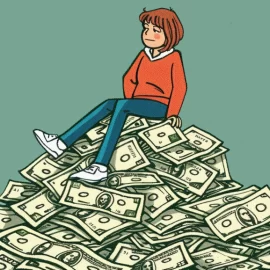

This article is an excerpt from the Shortform book guide to "Capital in the Twenty-First Century" by Thomas Piketty. Shortform has the world's best summaries and analyses of books you should be reading.
Like this article? Sign up for a free trial here .
What is a progressive income tax? Why should the wealthy pay more taxes?
In Capital in the Twenty-First Century, Thomas Piketty argues that since the 1980s, wealth inequality has made a troubling comeback that demands a response. His proposed solution is a progressive income tax.
Read more about Piketty’s case for progressive taxation and why other economists think differently.
The Necessity of Progressive Taxation
Piketty argues that progressivity—in which the tax burden falls most heavily on society’s wealthiest—is necessary for the tax system to function fairly. He writes that if the system were not set up this way and instead taxed the wealthy at lower rates and the poor at higher rates, middle and working-class people (who vastly outnumber the rich) would rightly begin to question why they should pay a higher share than the rich.
He warns that this could lead to the mass rejection of the very idea of a social state and a democratic society that has certain basic obligations to all its citizens.
Piketty notes that a progressive income tax encompasses more than just the taxation rates applied to income. Progressivity also comes from the kind of income being taxed. In particular, taxes on wealth and inherited wealth (both of which are forms of capital income) especially could be powerful tools for scaling back the wealth inequality that has defined most developed countries for the past 40 years.
Is a Market Society an Unequal Society?
In What Money Can’t Buy, philosopher Michael Sandel explores this theme of wealth inequality and the threat to a democratic society. Sandel writes that a market society is inherently a divided society—one in which more and more wealth is concentrated in the hands of fewer and fewer people, with these inequities only exacerbated by a regressive tax system. Unlike Piketty, Sandel is primarily concerned about the social consequences of inequality. Specifically, he warns that the financial gap between the affluent and the poor leads to social divisions, in which these groups share fewer and fewer common spaces and experiences.
Sandel argues that these developments are very dangerous for a democratic society, in which all citizens are supposed to be equal and share a common stake in the community’s welfare. When society’s wealthiest members lead such vastly different lives from everyone else (and have so much more power than everyone else) those bonds of commonality get weaker.
For example, the richest citizens might feel that they have little stake in the welfare of their fellow citizens because they have enough money to never have to worry about underperforming schools, crumbling infrastructure, or an antiquated healthcare system. The poorest citizens, meanwhile, might feel alienated from the common civic project if they come to feel that the political and economic system is rigged against them.
The Case Against Progressive Taxation
Some economists have taken the opposite view of Piketty—namely, that a progressive income tax harms lower-income families and individuals and creates perverse distortions of the tax system. In Capitalism and Freedom, Milton Friedman writes that progressive taxation increases pre-tax income inequality. He argues that if high earners know that their top marginal tax rate is going to be high, lucrative jobs become less attractive than they would otherwise be. The only way to compensate for this is to make these kinds of jobs even more well-paid—thereby increasing pre-tax inequality.
He also writes that progressive tax codes are nearly always more complex than alternative systems because they contain all sorts of loopholes and deductions that tax certain kinds of income (like capital gains) at different rates than other kinds of income (like standard wages and tips). This creates a strong incentive for wealthy people to devote inordinate resources to devising complex and wasteful tax-avoidance schemes.
Friedman further argues that despite the desires of economists like Piketty to use the tax system to more equitably distribute economic resources, progressive taxation systems designed to compel redistribution are inherently unjust. One of the cornerstones of a society based upon voluntary exchange is the right to keep what you earn because what you earn in the market is a product of the productive capacity of your own labor and capital.
The fairest and most efficient way to allocate resources in a system of voluntary exchange is through payment according to product. Your compensation is a direct result of the value you create in the economy through your labor (the work you perform for which you are paid in wages and tips) and your capital (the productive assets you own, like land or machinery).
Friedman argues that there is no moral justification for a majority to compel a minority to hand over its property—whether it’s a gang of armed robbers telling you to hand over the cash in your wallet or a majority of voters passing legislation to legally confiscate wealth from the so-called “1%.”

———End of Preview———
Like what you just read? Read the rest of the world's best book summary and analysis of Thomas Piketty's "Capital in the Twenty-First Century" at Shortform .
Here's what you'll find in our full Capital in the Twenty-First Century summary :
- An analysis of incomes, tax returns, and estate tax returns across different countries
- How capitalism, by its nature, generates economic inequality
- How inherited wealth will soon account for more than earned income






